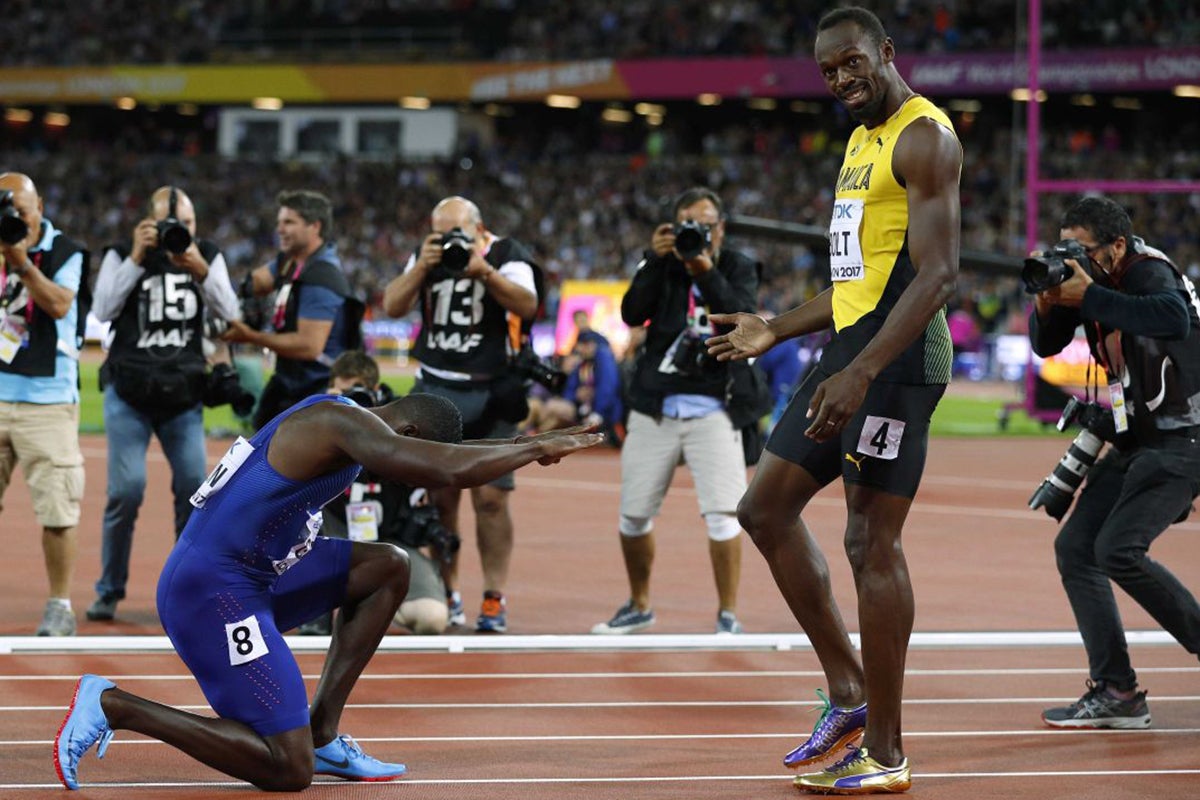Last night's Athletics Championships were a reminder of the disappointing legacy of the 2012 Olympics
Usain Bolt’s final race is a reminder that Britain never fulfilled the economic or social potential we were promised would come as part of our Olympic legacy

Five years ago Britain was in the midst of perhaps its greatest sporting summer, as Olympic heroes achieved unparalleled results in spectacular arenas, roared on – it seemed – by a united nation. Austerity had not yet truly bitten and Coalition Government still felt like a good idea. What a golden time it was.
When Sir Mo Farah was winning yet another World Championship gold on Friday in what is now called the London Stadium, it was easy to imagine for a moment that the world, the UK and athletics had stood still, that Britain’s Olympic legacy had somehow been secured. In truth though, a lot has changed in the last half decade. Usain Bolt’s defeat in Saturday’s 100m sprint final, his last individual race before he retires, was therefore rather more emblematic.
Most prosaically, the arena which made for such a wonderful Olympic venue is now – for most of the year – a football stadium. That transformation was inevitable if the hallowed ground which played host to 2012’s gold medallists was not to lie dormant. Indeed, other ex-Olympic venues in other countries have suffered much worse fates than being turned over to football, even if some will question the cost to the taxpayer of the switch. After all, £250m is hardly loose change, especially when added to the £429m that the Exchequer contributed to building the stadium in the first place.
On the plus side is the fact that the UK’s capital has a venue which can still, with a bit of seat reshuffling, host top-class athletics. Nothing but another Olympics will quite recapture the spirit of 2012 but the ongoing World Championships – and the Para Athletics equivalent which preceded it – have brought with them a reminder of the stadium’s original purpose. What’s more, it is arguable that the physical and economic regeneration of east London brought about by the UK’s hosting of the 2012 Games has been a lasting success story.
Seeing Sir Mo storming to victory has also, however, raised questions about the broader promises made five years ago; about how the Olympic Games would inspire a generation of Britons to turn off their TVs and their Facebook feeds, and instead head out for a run or pick up a badminton racket. Figures from Sport England last year showed that the number of people in England who are involved in any sport or exercise at least once a week had actually fallen since 2012 – down half a percent to just under 16 million. The picture is rather better in Scotland, with various sporting organisations having benefited from the £750,000 legacy funding that flowed from the 2014 Commonwealth Games in Glasgow. All in all though, planning has been inadequately coordinated to ensure a fitter or healthier UK.
At the elite level, an astounding number of triumphs at the Rio Games in 2016 suggested that Britain really had found the perfect formula for medal success. But the last year has seen angry disputes about the funding formula used by UK Sport, while British Cycling was embroiled even before Rio in rows about its practices. Moreover, the current World Championships have suggested that the current golden generation of UK athletes is coming to an end, and is not obviously being replaced by another.
But if the legacy of the 2012 Olympics for Britain is not all that it might be, the doubts are as nothing when set against those which continue to dog the wider community of competitive athletics. Seb Coe, the president of the IAAF, may contend that doping is not the sport’s “biggest challenge” but it is not a convincing view. When all’s said and done it is the use of drugs which has done most to undermine athletics’ credibility and therefore its relevance, which is what Lord Coe identifies as the biggest point of concern.
In this context, Bolt’s retirement is a disaster for world athletics. His smile and his brilliance – unsurpassed among modern athletes – will be mightily missed, but not more so than this record of being a multiple sprint winner who has never failed a drugs test. The fact that this is noteworthy tells its own tale. That Bolt was defeated on Saturday by Justin Gatlin, twice banned in the past for doping offences, serves further to emphasise the problem.
The IAAF, itself the subject of corruption scandals in the recent past, is doing its utmost under Lord Coe’s leadership to convince fans that they can believe what they see when they watch athletics. Yet there is much still to do. And without the credibility that comes with an effective drugs-prevention programme, the legacy of any Olympic Games or global athletics championship will always be somewhat sour.
Join our commenting forum
Join thought-provoking conversations, follow other Independent readers and see their replies
Comments
Bookmark popover
Removed from bookmarks